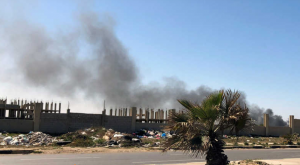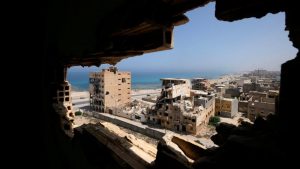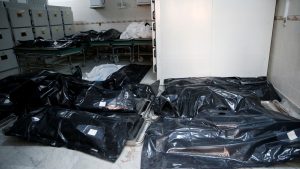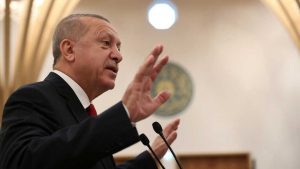Will the Libyan conflict lead to another faceoff between Turkey and Russia, similar to the one in Syria? It is a question that many in Turkey have been asking since the emergency security meeting that President Recep Tayyip Erdogan convened last week over the deployment of Russian warplanes to Libya from Syria. The arrival of the Russian jets complicated Turkey’s calculations soon after its allies seized a key air base near Tripoli, tipping the scales in the war thanks to Turkish military and intelligence support.
In fact, Ankara has long realized that Russia is the essential power it would have to deal with in Libya, no matter that it has been shaking its finger at Egypt and the United Arab Emirates as the main backers of renegade commander Khalifa Hifter and his Libyan National Army. This was already evident in January, when Moscow became the first go-to for Ankara after it signed two crucial deals with the Tripoli-based Government of National Accord and obtained parliamentary approval to deploy soldiers in Libya. Yet, a tentative Turkish-Russian deal on a cease-fire fell through Jan. 14 as Hifter refused to sign the agreement in a snub to Moscow, which has backed the Libyan National Army via the private military company Wagner, while maintaining diplomatic contacts with the Government of National Accord.
In a further sign of how Ankara feels pressed to deal with Moscow, Erdogan phoned Russian President Vladimir Putin on May 18, the day Turkey’s allies captured the al-Watiya air base, and Foreign Minister Mevlut Cavusoglu followed suit two days later, calling his Russian counterpart Sergey Lavrov.
The arrival of Russian jets in Libya, however, altered the situation anew.
The Government of National Accord’s interior minister said May 21 that at least six MiG-29s and two Su-24s had flown from the Khmeimim base in Syria to Hifter’s bases in eastern Libya. On the same day, Hifter’s air force commander threatened to unleash “the largest aerial campaign in Libyan history,” saying that all Turkish positions would be “legitimate targets.”
As Hifter loses ground in Libya, Egypt weighs options to support him
While Egypt supports Libyan commander Khalifa Hifter against the Turkish-backed Government National Accord, it will refrain from interfering directly in the war.
The prime minister of Libya’s UN-recognized Government of National Accord (GNA), Fayez al-Sarraj, announced May 18 that his forces had taken control of the key al-Watiya air base from the forces of Khalifa Hifter, commander of the so-called Libyan National Army (LNA).
On the same day, Egyptian President Abdel Fattah al-Sisi met with Commander-in-Chief of the Egyptian Armed Forces Gen. Mohamed Zaki and other prominent military leaders including the chairman of the Armed Forces Operations Authority, the head of the Armed Forces Engineering Authority and the commander of the Central Military Region.
Sisi said it is important to show the highest level of combat readiness to protect Egypt’s national security. The meeting discussed the latest Libyan developments and stressed Sisi’s rejection of foreign interference in Libyan internal affairs.
Presidential spokesman Bassam Rady said in an official statement that the president was briefed during the meeting on the security situation on all Egyptian strategic fronts as well as on the efforts of the armed forces to control the border and pursue terrorists in North Sinai and the Libyan border.
In the early hours of May 19, LNA spokesman Maj. Gen. Ahmed al-Mismari issued an official statement in which he explained that Hifter had commanded the relocation of his forces from the Tripoli front lines, stressing he had not been defeated as the GNA claims. Hifter’s forces have suffered a series of setbacks in recent weeks as pro-government forces seized the cities of Sabratha and Sorman, west of the capital.
“The withdrawal of the forces from the al-Watiya base kicked off three or four months ago, when we withdrew combat aircraft, ammunition, spare parts and heavy equipment. Individuals subsequently withdrew under air cover,” he added, describing the withdrawal process as excellent and aimed at preserving lives.
On the sidelines of Sisi’s meeting with the African Union-led Contact Group on Libya, the Egyptian presidency issued another, more direct statement regarding the Libyan developments. According to it, Sisi stressed during the meeting that Libya’s stability is vital to Egypt’s national security and that Egypt has not and will not tolerate terrorist groups or parties who offer support them.
Khaled Okasha, head of the Egyptian Center for Strategic Studies, said the LNA found it important to pull back amid mounting pressure on al-Watiya air base.
Okasha told Al-Monitor that Hifter’s withdrawal from the base was a tactical move to protect the remaining military equipment and weapons that were not destroyed in Turkey’s airstrikes.
An Egyptian security source told Al-Monitor on condition of anonymity that Hifter’s withdrawal from al-Watiya is not a defeat but a tactical move to amass forces in the city of Tarhuna, southwest of Tripoli. The city is considered a launching point for Hifter’s forces to liberate Tripoli from the hands of terrorist militias backed by Turkey, the source added.
He pointed out that Egypt will continue to support Hifter politically, diplomatically, logistically and security-wise against terrorist groups in Libya.
The source said strong coordination continues between the Egyptian leadership and Hifter, with whom Sisi met in August 2019 to discuss several issues including the battle for Tripoli.
Al-Arabiya reported that during the August 2019 meeting, Hifter requested Egyptian support for the LNA in international forums, especially with regard to lifting the arms embargo imposed on Libya, and that the two discussed security coordination between their countries.
Libyan journalist Abdel Sattar Hoteitah said that the recent Turkish strikes in support of the GNA in Libya were primarily aimed at evicting Hifter from Tarhuna, but when the strikes failed to achieve their goal, [Turkey] sought to pressure Hifter on another front.
On May 20, GNA spokesman Colonel Mohamed Qanunu announced the destruction of an air defense system used by Hifter’s forces in Tarhuna. Qanunu said his forces are also pursuing Hifter’s fighters in the capital.
Mismari, meanwhile, asserts that Turkey sent 1,500 Islamic State fighters in Syria to support the government in Libya.
Hoteitah stressed that Egypt fully supports Hifter in his war against terrorist militias backed by Turkey and said that while Egypt will not intervene militarily in Libya, it will nonetheless support Hifter at the security and logistical levels.
It’s Syrian vs. Syrian in Libya
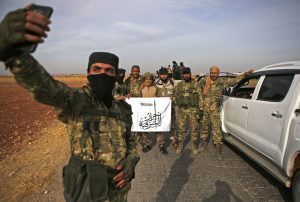
Mohammad Abu al-Saar, a mechanic at a car repair shop in Homs, Syria, was detained and tortured by the country’s ruling regime, like thousands of other protesters, in one of its dungeons. (His name is changed in this article at his request.) The day he was released, he picked up a weapon to seek revenge, guard his city, and usher in a new era of political freedom. It was April 2012, just a year into the rebellion—there was still hope for a positive outcome.
Eight years later, he is a hired gun, fighting in someone else’s war, over 1,200 miles away in Libya. And when he looks across the Libyan battlefield, there’s a good chance that he soon could be facing another Syrian.
Saar is among the Syrian rebels paid by Turkey to fight alongside the forces of the Government of National Accord (GNA), one of the sides claiming power in the protracted Libyan conflict, which began with an uprising against Muammar al-Qaddafi in 2011 and is now a battle for lucrative oil deals and regional influence. The GNA is recognized by the United Nations and backed by the Muslim Brotherhood, a transnational group that propagates political Islam with the support of powerful allies such as Turkey’s President Recep Tayyip Erdogan. Shared allegiance with the Brothers brought Turkey to the interim government’s aid, and its enhanced military support has recently turned the tide of the war in the GNA’s favor.
Saar, however, is just a pair of hands in the broader struggle. A 38-year-old father of four, Saar metamorphosed from a rebel to a mercenary as a consequence of prolonged privations inflicted by unending war in Syria. “My wife and four children live in a tent. I don’t have money to buy cement blocks to build a room for them,” he told Foreign Policy over the phone from Libya. “When my wife gave birth, I didn’t even have money to buy diapers and milk for the baby.”
In 2014, Homs was lost to Bashar al-Assad’s regime forces, and Saar moved with his family to rebel-held Aleppo. There he joined the Sultan Murad Division, a rebel group made up mainly of Syrian Turkmen trained and funded by Turkey. But Turkey’s intentions were not entirely altruistic; it supported the rebels, but it also beckoned them to fight for its own interests.
Saar is an Arab, not a Turkmen, but he chose to join the group to earn a living. In 2018, he was among the rebels hired by Turkey to oust Kurdish militias and hundreds of thousands of civilians from Afrin in northern Syria. (Turkey accuses the Kurdish militias of conducting terrorist attacks inside Turkey and instigating secession.) In Afrin, Saar was paid 450 Turkish liras, a paltry stipend that comes to $46 a month. Libya, however, is a much more profitable assignment. “In my four months in Libya, I have earned more than I did in years of fighting in Syria. I earn $2,000 a month,” he said, sounding relieved at the whopping jump in his income.
Back home in Syria, other former rebels, dealing with the same deprivation, were being enticed to join the same war—but on the side of the commander Khalifa Haftar, the GNA’s main rival backed by Russia, the United Arab Emirates, and Egypt.
As Turkey flooded Libya with its Syrian proxies, it also provided state-of-the-art drones and air defense systems. In March, Russia turned to Syria for reinforcements. It roped in its Syrian ally Assad to back its preferred Libyan warlord and began scouting for men willing to render services in a foreign conflict in exchange for cash.
Syrian rebels say the man tasked with leading this recruitment drive was Col. Alexander Zorin, who in 2016 served as the Russian defense ministry’s envoy at the Geneva-based task force on cessation of hostilities in Syria. Zorin is better known in Syria as “the godfather” of reconciliation deals between the regime and rebels in Ghouta, Daraa, and Quneitra. A Russian source confirmed that in early April, Zorin visited southern Syria, a region believed to be especially fertile ground for Russian recruitment not only due to rampant poverty but also owing to the absence of support from any other regional or global power. Many rebels in the area had already switched their allegiance to Assad in July 2018 after the United States refused them further help.
In cooperation with Assad’s intelligence officials, Zorin is believed to have initiated negotiations with a number of rebel groups to send them to fight in Libya. Abu Tareq (his name has been changed for this article), the leader of a rebel group that fought the Islamic State in Quneitra in southern Syria, told Foreign Policy he met Zorin and agreed to go to Libya along with his fighters. “We met him, and he told us we were going to Libya with the security company [Wagner],” said Tareq from Syria. “He made a generous offer, $5,000 per month for a commander and $1,000 for a fighter. Of course, we agreed, because the financial situation is horrible in our area.” Tareq added that the rebels were enticed not just with monetary inducement but also with amnesty for those who fled the draft and those against whom the regime kept a file for payback later. Abu Jafer Mamtineh, the leader of another rebel group in southern Syria, also proved credulous. He bused out over a hundred young men to be trained by the Russians at a training base in Homs in mid-April.
Ahmad Khatib, an insider with rebel factions in the south, backed Tareq’s account. (His name is changed at his request to protect his identity.) “Col. Zorin’s message was that the former rebels may expand their power and increase the number of their fighters on the condition that they send at least 1,000
Libyan Oil Revenues Fall Year-on-Year
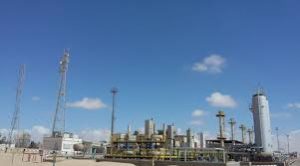
23% gain in revenues in December from November; total 2019 revenues 8.4% down on 2018
The National Oil Corporation (NOC) reported December 2019 revenues of approximately 2.2 billion USD ($2,186,488,241.19), an increase of around 405 million USD (23%) on November 2019, mostly due to an increase in the oil price of around 5.42 USD per barrel between October and November sales.
2019 annual revenues, at 22.495 billion USD, were around 8.4% down on 2018’s figure of 24.55 billion USD. These figures reflect a drop in the oil price, from an annual average of 69.78 USD per barrel in 2018 to 63.83 USD per barrel in 2019.
NOC’s revenues come from sales of natural gas, crude oil and assorted derivative products, in addition to taxes and royalties received from concession contracts.
According to NOC Chairman Eng. Mustafa Sanalla:
“Despite many challenges, NOC maintained consistent production, generating the vital revenues that the Libyan people depend on and contributing to global oil market stabilisation.”
December’s revenues were 8.5% down compared with the same month last year, reflecting a slight decrease in the price of oil. December revenues are generated from sales made in November. The average OPEC basket crude oil price in November 2019 was 62.94 USD, while in November 2018 it was 65.33 USD.
NOC embraces transparency as one of Corporation’s key values, and has reported monthly revenues dating back to January 2018, setting a standard for other Libyan institutions.
NOC pays all revenues from sales of oil and gas products to the Central Bank and receives its operating and capital budgets from the Ministries of Finance and Planning, disbursed by the Central Bank.
(Source: National Oil Corporation)
Libya Improves Ranking in Corruption Perceptions Index
Transparency International has said that Libya’s ranking has risen slightly in its global Corruption Perceptions Index (CPI).
From a total of 180 countries, Libya came in at number 168; last year’s position was 170 out of 180 countries.
This result puts it on equal ranking with Haiti, the Democratic Republic of the Congo, and Guinea Bissau.
Iraq was ranked in 162nd place, with Iran in 146th.
New Zealand beat Denmark to first place, with Somalia in last place.
The Corruption Perceptions Index ranks countries and territories by their perceived levels of public sector corruption according to experts and businesspeople.
UN Libya mission ‘concerned’ over threats to block oil exports

The call comes after Libya’s national oil company warned against attempts to blockade ports ahead of the Berlin summit.
The United Nations mission in Libya has express deep concern over efforts to disrupt oil production in the war-torn country and urged all sides to exercise restraint.
“This move would have devastating consequences first and foremost for the Libyan people who depend on the free flow of oil for their well-being,” the mission said in a statement on Saturday, the eve of a highly-anticipated summit in Germany aimed at relaunching peace efforts.
It came after tribes close to renegade military commander Khalifa Haftar, whose forces control much of eastern Libya, called for a blockade of coastal oil export terminals to protest against a Turkish intervention in support of the country’s UN-recognised Government of National Accord (GNA).
Libya’s National Oil Company (NOC) had also warned on Friday against threats to block oil exports, saying it “strongly condemns calls to blockade oil ports ahead of the Berlin conference on Sunday”.
After nine months of fighting, which has killed more than 2,000 people, a ceasefire came into effect on Sunday backed by both Ankara and Moscow, which is accused of supporting Haftar.
However, after Turkey deployed troops to support the GNA, tribes close to Haftar threatened to close down the “oil crescent” – a string of export hubs along Libya’s northeastern coast under Haftar’s control since 2016.
His troops have also mobilised to block any counterattack on the oil crescent, the conduit for the majority of Libya’s crude exports.
“The closure of the fields and the terminals is purely a popular decision. It is the people who decided this,” Ahmad al-Mismari, spokesman for pro-Haftar forces, told al-Hadath television late on Friday.
The tribes also called for the “immediate” closure of the Mellitah, Brega and Misrata pipelines.
Commenting on the closures, the UN envoy to Libya said on Saturday he hoped but “could not predict” whether oil ports would be reopened in a few days.
“If the thing is not solved between today and tomorrow I expect the issue to be raised, yes,” Ghassan Salame told Reuters news agency, referring to the meeting in Berlin that will try to broker a reopening of the ports.
The head of the eastern Zouaya tribe told AFP news agency that blocking exports would “dry up the sources of funding for terrorism via oil revenues”.
NOC chairman Moustafa Sanalla said the oil and gas sector was “vital” for the Libyan economy, as it is the “single source of income for the Libyan people”.
“The oil and the oil facilities belong to the Libyan people. They are not cards to be played to solve political matters,” he added.
“Shutting down oil exports and production will have far-reaching and predictable consequences.”
Potential consequences
Meanwhile, a port engineer and witnesses told Reuters news agency that protesters in eastern Libya entered the Zueitina oil terminal on Friday and announced its closure in response to the calls by tribal leaders.
However, the Zueitina engineer said “the terminal is still receiving oil and a tanker entered it today”.
Scores of protesters reportedly erected a large tent outside the terminal. They read a statement saying they planned to shut all oil terminals in eastern Libya.
Zueitina usually loads around 14 oil tankers per month and receives gas tankers, the port engineer said.
The oil-rich North African state has been in turmoil since a 2011 NATO-backed uprising that overthrew and killed longtime ruler Muammar Gaddafi.
Its oil sector, which brings in almost all of the state’s revenues, has frequently been the target of attacks.
Sanalla noted the consequences of exports and production being shut down for an extended period could be devastating.
“We face collapse of the exchange rate, a huge and unsustainable increase in the national deficit, the departure of foreign contractors, and the loss of future production, which may take years to restore,” he said.
“This is like setting fire to your own house.”
Haftar will come under pressure to end his campaign to take Tripoli at the summit in Berlin, which is aimed at ending foreign interference and division over Libya, according to the UN.
The conference will seek to agree to six points including a permanent ceasefire, implementation of a much-violated UN arms embargo and a return to political efforts for peace, UN Secretary-General Antonio Guterres said last week.
All eyes on Berlin as Libya rivals, world powers set for talks
Representatives from Libya’s warring sides, as well as from several nations, due to meet in latest bid to end fighting.
The two leading parties in Libya’s war, as well as representatives from their foreign backers and other nations, are expected to gather in Germany on Sunday for a highly-anticipated summit aimed at ending nine months of conflict in the North African country.
Libyan Prime Minister Fayez al-Sarraj, head of the United Nations-recognised Government of National Accord (GNA), and Khalifa Haftar, commander of the self-styled Libyan National Army (LNA), are due to join discussions with Russia, Turkey, France, Italy, the United States and others on ending the war, which has raged since Haftar’s forces began an advance on the capital, Tripoli, in April last year.
The warring sides earlier this month agreed to a ceasefire brokered by Russia and Turkey, though Haftar dramatically departed talks in Moscow on January 12 before signing the formalised agreement with al-Sarraj.
Sunday’s Berlin summit is the latest attempt to restore stability and peace to Libya, which has been splintered between competing factions and militias since former leader Muammar Gaddafi was overthrown and killed during a NATO-supported uprising in 2011.
The deeply divided country currently has two rival administrations: The Tripoli-based GNA and another allied with Haftar in the eastern city of Tobruk.
German Chancellor Angela Merkel has said that enforcing a UN arms embargo on Libya will be a priority at the summit. The host nation has been pushing to ensure that political dialogue, rather than further violence, will resolve the conflict – a stance sometimes at odds with the interests of other European Union members such as France and Italy, which have shown support for Haftar, whose eastern-based forces have been accused of indiscriminately bombing civilians.
“What will be signed up to in Berlin has already been agreed upon, including the embargo, the principles of a ceasefire and what the peace process that follows it must entail,” Tarek Megerisi, policy fellow at the European Council on Foreign Relations, told Al Jazeera.
“It will be kind of a general freeze-frame of current countries, what level of influence they have and [what] they’ve been able to impart on the communique that will be signed up to.
“But if previous agreements are anything to go by, I don’t think anybody’s really intending to stick to what they agree to in Berlin.”
International support
The conflict has drawn in several countries from the Middle East and beyond, with Turkey supporting the GNA and Russia, the United Arab Emirates (UAE) and Egypt backing Haftar’s LNA.
Recent months have seen an increase in military involvement from foreign powers, with mercenaries from Russia’s Wagner Group – a paramilitary organisation – reportedly joining the LNA on the front lines and the UAE bolstering air support for Haftar’s forces, who are positioned in the suburbs of Tripoli but have been unable to capture the city.
Since signing in November two separate deals with the GNA (one on security and military cooperation and another on maritime boundaries in the eastern Mediterranean), Turkey has strengthened its presence in western Libya, with President Recep Tayyip Erdogan recently confirming that Turkey had sent troops into the country.
“[These military] escalations … are a by-product of what’s going on in Berlin,” said Megerisi, adding that increasing awareness that the Berlin summit was imminent prompted all sides to seek to strengthen their positions on the ground before formal commitments were made in Germany.
“I think that both sides are ready to continue fighting. They just don’t know when it’s going to start,” he said.
Haftar paid an unexpected visit to Greece on Friday, meeting Prime Minister Kyriakos Mitsotakis and Foreign Minister Nikos Dendias, who spoke warmly of his talks with the renegade military commander, saying Haftar had agreed to void the maritime agreement struck between Turkey and the GNA.
The deal grants Ankara an exclusive economic zone in the eastern Mediterranean, an area potentially rich in unexplored energy resources, provoking fury from Greece, Egypt and Cyprus.
Greece, which has not been invited to the Berlin summit, said it would veto at the EU level any deal that honours the November agreement, which it claims violates international law.
Forgotten civilians
While the build-up to the summit has focused on high diplomacy, the stakes are highest for civilians in Libya, where the effect of the conflict has been devastating, especially in the area around Tripoli where most of the fighting has been concentrated.
Hundreds of civilians have been killed since Haftar’s offensive began in April. More than 150,000 people have been displaced, over half of whom are children, according to the UN.
Water and waste management systems have been severely damaged, raising the risk of cholera and other waterborne diseases.
“None of these political tracks … have seen that civilians, and the effect of these conflicts on civilians, has taken centre stage,” said Hanan Salah, senior researcher for Libya at Human Rights Watch (HRW).
“And that has been a huge problem in all of the interventions to date. Even when it came to the UN-led process, we also didn’t see a strong focus on justice and accountability. It has always been: ‘Let’s get a quick and dirty political settlement’.”
In July last year, head of the UN Support Mission in Libya Ghassan Salame proposed a three-point peace plan, involving a truce, a meeting of all nations involved in the conflict, and the establishment of political, military and economic tracks.
“I’m hoping that at some point there will be a democratic process and people will be able to choose who represents them, instead of actors who have hijacked the situation and are doing exactly as they please,” HRW’s Salah said.
In Libya, a grand bargain remains elusive

Burhanettin Duran
Libya’s putschist Gen. Khalifa Haftar left the negotiating table in Moscow last week, putting off the prospect of a cease-fire until this weekend’s Berlin conference . The man trying to topple Libya’s internationally recognized, legitimate government did so under pressure from the United Arab Emirates. He denied Russian President Vladimir Putin his diplomatic accomplishment, fueling disappointment and anger in the Kremlin. It is possible that France and the United States, too, did not want the decision to end the Libyan crisis to be taken in Moscow. Seeing that he was more dependent on his other patrons than Russia, Haftar concluded that he could survive without the Wagner Group, a Russian paramilitary organization whose mercenaries have been fighting for the warlord in Libya. To be clear, a frustrated Moscow is unlikely to withdraw its proxies from the battlefield. Putin won’t abandon Haftar to preserve his influence over the negotiating table in Berlin. The Kremlin will act rationally, looking to protect its geopolitical interests in Syria, the Eastern Mediterranean and Libya. The Russian president, however, could look to strengthen his relations with the Libyan Government of National Accord (GNA) due to the limits of Haftar’s influence. In my view, the cease-fire agreement’s postponement until the Berlin conference was not a serious problem for Turkey.
The Turkish government, which became a heavyweight in the Libyan conflict by concluding two agreements with the GNA in late November, will be a powerful player wherever the negotiating table is set. First of all, Turkey proved that it could keep its promises by persuading Libyan Prime Minister Fayez al-Sarraj to sign the cease-fire agreement. It was Moscow’s reputation that Haftar tarnished. At the end of the day, the Turkish-Russian cease-fire initiative will continue in Berlin. The Libyan warlord, who disappointed the Russians, left Moscow with zero accomplishments and ended up accepting Germany’s invitation.
For Turkey, what matters is to get the cease-fire deal done. If the parties reach an agreement in Berlin, that would be a good thing because Europe would have to get involved. Keeping in mind the Libyan civil war’s implications for terrorism and the refugee crisis, Turkey’s interests are aligned with Germany and Italy. Obviously, Ankara and Moscow could have expedited the process as co-guarantors. Nonetheless, they would have needed to get the European Union and the United States on board for a lasting cease-fire to take place and for the reconstruction of Libya.
In light of the latest developments, Germany emerged as a heavyweight. Yet there is no reason to believe that the parties will agree on everything in this initial round of talks. Instead, all stakeholders must be prepared for a Berlin process involving a multitude of such summits. After all, finding a middle ground between the various participants in the Libyan conflict won’t be easy. There are people in Sarraj and Haftar’s corners, who believe that they can still achieve a military victory, and they will need to be convinced.
So what will be on the table in Berlin? The technical issues are hardly serious. Judging by the preliminary meetings and the consensus in Moscow, the parties will negotiate a cease-fire and the arms embargo as well as the establishment of a 5+5-strong joint military commission and a 40-member political dialogue committee. Italy’s proposal to send U.N. peacekeepers to Libya, too, could be on the agenda.
Still, it will be difficult for everyone with a vested interest in Libya to agree on the country’s future. Germany and the United Kingdom will presumably stay neutral, whereas Turkey, Italy and Algeria will support the GNA. The United States and China will monitor the proceedings with low-level representatives, while France, the UAE and Russia will back Haftar. The obvious question is how Moscow will respond to its latest embarrassment at the hands of the putschist general. It is possible that the United States, unwilling to let Russia dominate the negotiating table in Berlin, will make a few surprise moves through France and the UAE.
Turkey’s military involvement in Libya set to grow
Turkey is poised to formalize its military support to Libya’s internationally recognized government, that would inclue dispatching a rapid reaction force to the war convulsed North African nation if need be, under the terms of an agreement that will be brought before the Turkish parliament for ratification
Turkish President Recep Tayyip Erdogan renewed his pledge to provide the Tripoli-based Government of National Accord (GNA) with backing in wake of a deal they signed Nov. 27. It covers intelligence-sharing and arms deliveries, among other things.
“We will be defending the rights of Libya and Turkey in the Eastern Mediterranean,” Erdogan told the pro-government AHaber news channel Dec. 15. The announcement came a day after GNA Prime Minister Fayez al-Sarraj met with Turkish Foreign Minister Mevlut Cavusoglu and Defense Minister Hulusi Akar in Qatar, his government’s other top mentor.
Egypt, Saudi Arabia, the United Arab Emirates and France are aligned with Khalifa Hifter, the Libyan general turned warlord who seeks to topple the GNA with his Libyan National Army. Egyptian President Abdel Fattah al-Sisi swiftly took aim at Erdogan’s comments, riposting, “We could have intervened in Libya. But we didn’t do this and respected Libya’s circumstances to preserve fraternity.”
The Tobruk-based parliament in Hifter’s eastern Libyan stronghold has called the Turkish security agreement with Tripoli invalid.
Hifter vowed last week to make a final push to take Tripoli, but the steady supply of arms and mercenaries to both sides has resulted in a stalemate since April, when Hifter launched his latest offensive. Ankara dispatched armed drones, which Hifter’s forces shoot down. The UAE supplied Hifter with more lethal Chinese-made drones, according to The New York Times.
A recent UN report showed that supporters of both camps have flooded either side with weapons, in breach of UN sanctions.
Hifter, 76, has waged an intermittent campaign to take Tripoli since 2014. Russian support, however, has allowed his forces to make advances in recent days.
Turkish muscle-flexing — most recently in Syria, where it launched an Oct. 9 assault against a US-backed Kurdish militia — has sparked a torrent of proposed US sanctions and alarm bells across the region. Erdogan shows no signs of backing down in the face of mounting pressure. He threatened over the weekend to kick US forces out of Incirlik air base and the Kurecik radar station in Malatya, which is used to spy on Iran, should US sanctions go into effect.
In tandem with their security agreement, Turkey and the GNA have also signed a memorandum of understanding on delineating maritime boundaries, which effectively extends Turkey’s continental shelf in the Eastern Mediterranean.
Ankara crafted the move to counter its regional rivals, Cyprus, Greece, Egypt and Israel. All claim drilling rights for hydrocarbon reserves in the Eastern Mediterranean and are acting in concert against Turkey. Turkey has raised the stakes, sending drill ships off the coast of Cyprus accompanied by naval vessels to protect them.
Greece has complained to the United Nations, calling the maritime deal with the GNA illegal and even booting the Libyan ambassador to Athens in response. Greece has the backing of its fellow EU members. The Brussels-based bloc has vowed to impose sanctions on Turkey if it doesn’t reverse course.
There are few signs it will.
“Libya’s internationally recognized government and the [self-declared] Turkish Republic of Northern Cyprus are Turkey’s only allies in the Eastern Mediterranean,” said Ozgur Unluhisarcikli, the Turkey director for the German Marshall Fund of the United States, a Washington DC-based think tank. “It’s therefore not surprising that Turkey decided to seal this agreement with Sarraj.”
Detractors have spun the narrative of Ankara’s backing for the GNA as one of an increasingly interventionist Turkey seized by neo-imperial ambitions and Muslim Brotherhood leanings. Analysts warn, however, that this reductionist take fails to convey the full picture.
Inga Kristina Trauthig, a research fellow at the International Center for the Study of Radicalization in London, told Al-Monitor, “A significant chunk of the war is playing out in propaganda, especially online. No Libyan force wants to be seen as dependent on foreign powers, but all forces have international connections, so it’s important to work on countering and/or framing these connections.”
Trauthig continued, “Instead of being interpreted as a renewed military pledge, the latest [agreements between Turkey and the GNA] have quickly found their way into the toxic dominating narratives of the current civil war — in this case, that the GNA is a government propped by Turkey.”
In fact, Turkey initially opposed the 2011 NATO-led intervention that brought down Moammar Gadhafi and plunged the energy-rich country country into chaos. One reason was Turkey had $15 billion worth of outstanding contracts in Libya. Erdogan’s pious base also opposed Western military intervention against a fellow Muslim country. Erdogan had urged Gadhafi to step down and allow a peaceful transition. Turkey eventually fell in line behind the international coalition when it was clear Gadhafi’s fate was sealed.
Some argue that the bigger risk in Turkey deepening its involvement in Libya is that it will butt heads with Moscow, as it did in the early days of the Syrian conflict.
While Russia formally disavows taking sides in Libya, it’s an open secret that an army of Russian mercenaries called the Wagner Group is helping Hifter with Moscow’s tacit consent.
Kerim Has, a Moscow-based Turkish expert on Russian affairs, agrees that things could get sticky between Turkey and Russia in Libya, depending on how far the sides push their involvement in direct confrontation with the other.
Has told Al-Monitor, “Ankara’s stance in Libya is a clear portent of a new sphere of tension in Turkish-Russian relations. There are no signs that Russia supports the Turkey GNA deal. Quite the opposite. It’s clearly disturbed by it, in particular with the articles pertaining to military cooperation.”
Moscow’s discomfort stems in part from its view that the Islamic State, Jabhat al-Nusra and other jihadi elements have joined the ranks of GNA forces, Has said. Moscow would rather do business with the more secular Hifter, who, in any case, would likely give Russia a healthy stake in the country’s energy sector, if he were to prevail.
That said, Has believes that while neither Ankara nor Moscow will switch sides in Libya, they will also avoid a dust-up because larger common interests are at stake. He said, “While efforts are underway for the activation of the [Russian-made] S-400 missiles, when talks have begun for the sale of Russian Su-35 jets to Turkey, when Russian gas from the Turk Stream pipeline [to Turkey] is about to flow, it’s unlikely that either Moscow or Ankara would desire direct conflict in Libya.”
Are Russia and Turkey in tug of war over Libya?
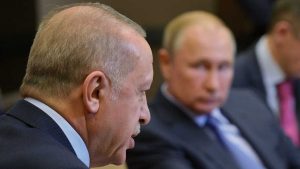
Russian President Vladimir Putin and his Turkish counterpart Recep Tayyip Erdogan discussed the situation in Syria and Libya in a Dec. 11 phone call. The Turkish side initiated the conversation to address the countries’ emerging differences over Libya that the two were trying to patch up. A few days earlier, Erdogan had declared his readiness to dispatch soldiers to Libya.
“There is a security company from Russia [in Libya] called Wagner,” Erdogan said. “This company sent its security staff there. On the issue of sending soldiers … if Libya makes such a request from us, we can send our personnel there, especially after striking the military security agreement.”
Erdogan and the head of Libya’s Government of National Accord, or GNA, Fayez al-Sarraj, signed memorandums Nov. 27 on maritime boundaries and security cooperation, prompting unease in Moscow. Russian Foreign Ministry spokeswoman Maria Zakharova stressed that the memorandums “could disrupt preparations for an international meeting on a Libyan settlement scheduled to be held in Berlin later this year.”
Such a stance in Moscow signals concern that Turkey’s military support for the Tripoli-based government may wreck the attempts of Khalifa Hifter’s allies, including Russia, to bolster Hifter’s standing ahead of the Berlin talks.
Despite Russia’s efforts to adhere to the “principle of equidistance with all players” on the ground, it seeks to buttress Hifter and his supporters in the Libyan war. The Kremlin expects Hifter, the commander of the Libyan National Army (LNA), and his backers to have the final say in post-war Libya, albeit while maintaining a balance of power and even, perhaps, keeping Hifter’s opponents on as legitimate political forces. However, Ankara’s greater military contribution to Tripoli complicates the scenario, and Hifter himself still lacks international legitimacy following his failure to impose a military settlement on the Libyan conflict.
At the same time, Moscow is hedging its bets by maintaining ties with Tripoli, in particular through contracts that Russian oil and gas companies signed with Libya’s National Oil Corporation in December. Russia’s Tatneft will conduct oil exploration in a contested area in the Ghadames Basin, which borders areas controlled by both the LNA and GNA. This contract reflects Russia’s desire to preserve relations with both warring parties, for the operations here are impossible without security guarantees from both sides. Another company, the Gazprom-affiliated Wintershall, which is based in Germany, will explore oil in the Sirte Basin, which is largely under GNA control. For this operation, the National Oil Corporation and Wintershall agreed to establish a joint venture, al-Sirir Petroleum Operations Company.
In turn, the Erdogan-Sarraj memorandums, especially the one on maritime borders, testify to a long-term partnership between Ankara and Tripoli. The agreements, which clear the way for Turkey to secure oil shale deposits in the Mediterranean Sea, depend on the GNA, or its loyal successors, being in power. Ankara will therefore continue to stand by Sarraj’s government.
One should take Erdogan’s statements about sending troops to Libya seriously. The Turkish leader has already honored previous promises to help Sarraj. Shortly after Erdogan pledged in late April to use all his country’s “capabilities to prevent the conspiracy against the Libyan people,” the Amazon Giurgiulesti ship arrived in Tripoli from the Turkish port of Samsun, loaded with Kirpi II 4×4 armored personnel carriers and several Vuran vehicles for the GNA-loyal army. Ankara did not conceal the transfer of these weapons, which defy UN sanctions. Around the same time, Turkey also supplied its Bayraktar combat drone to the GNA army.
Back then, Ankara’s assistance allowed Hifter’s adversaries to act more aggressively and take over the city of Gharyan, the LNA’s main rear base, from Hifter’s backers. Now that Russian private military companies allegedly operate in Libya backing Hifter, Turkey seeks to step up its own aid to Tripoli, all of which could dramatically tilt the balance of power.
Though the presence of Russian mercenaries and military personnel in Libya and their assistance to Hifter are beyond doubt, the role of those mercenaries in operations near Tripoli seem grossly exaggerated, which LNA officials themselves confirm.
The circumstances of Russia’s military presence in Libya have yet to be clarified. Contradictory news reports occasionally surface regarding the activities of Russian mercenaries and military in support of Hifter.
Some reports suggest that the presence of Russian mercenaries and advisers has materially improved the performance of LNA snipers as well as the mortar and artillery. However, in a televised interview with Emirati al-Aan, a person presented as a wounded Russian mercenary said he largely stayed in Benghazi and only occasionally went to Tripoli. However, he was primarily tasked with training Libyan fighters to operate in urban terrain.
Most of the LNA’s assistance, however, must still be rendered by the United Arab Emirates, Egypt and Jordan, while Russia does not appear capable of securing Hifter’s triumph in the fight for Tripoli.
Instead of sending its military, Turkey could deploy its own private military companies to Libya, first and foremost SADAT. Remarks from Russian Foreign Minister Sergey Lavrov on “the increasing number of Syrian fighters from Idlib seen on the ground” in Libya may suggest that SADAT fighters are already operating in Libya. Turkish private military companies may have even engaged Syrians for Ankara’s foreign ventures. If that is indeed the case, Turkey would be the only party capable of facilitating such a deployment to Libya. Thus, the threat of a direct clash between Russian and Turkish mercenaries, if not their respective militaries, looms in Libya.
Eventually the Libyan dossier may enter into Russia and Turkey’s current deals regarding Idlib and northeastern Syria. This is why Russian aid to Hifter can be seen as another way for it to exert pressure on Ankara. However, the consolidation of Hifter’s position ahead of the conference on Libya also plays into Moscow’s hands, to a large extent. Moreover, one cannot ignore Russia’s possible “packaged” agreements with the UAE, which include both the Libyan and Syrian issues. For instance, Moscow has provided Hifter — an Emirates ally — with more fervent assistance in exchange for the UAE backing the restoration of the Syrian regime’s legitimacy.
المركز المغاربي للأبحاث حول ليبيا
تعريف:
تأسس المركز المغاربي للأبحاث حول ليبيا في جوان - يونيو 2015 في تونس، وهو أول مركز من نوعه يعمل بكل استقلالية من أجل تعميق المعرفة بليبيا في جميع المجالات والقطاعات، ويرفد بالمادة العلمية جهود المجتمع المدني في ليبيا لإقامة الحكم الرشيد، المبني على التعددية والتداول السلمي واحترام حقوق الإنسان . مؤسس المركز: الإعلامي والباحث التونسي رشيد خشانة يقوم المركز بنشر مقالات وأوراق بحثية بالعربية والأنكليزية والفرنسية، ويُقيم مؤتمرات وندوات علمية، وباكورة نشاطاته ندوة حول "إسهام المجتمع المدني في إعادة الاستقرار والانتقال الديمقراطي بليبيا" يومي 5 و6 أكتوبر 2015 بتونس العاصمة.
موقع "ليبيا الجديدة"
موقع إخباري وتحليلي يبث الأخبار السريعة والتقارير السياسية والاقتصادية والثقافية والاجتماعية عن ليبيا، ديدنُه حق المواطن في الإعلام، ورائدُه التحري والدقة، وضالتُه الحقيقة، وأفقهُ المغرب العربي الكبير. يتبنى الموقع أهداف ثورة 17 فبراير ومبادئها السامية ويسعى للمساهمة في بناء ليبيا الجديدة القائمة على الديمقراطية واحترام حقوق الانسان والحكم الرشيد.

